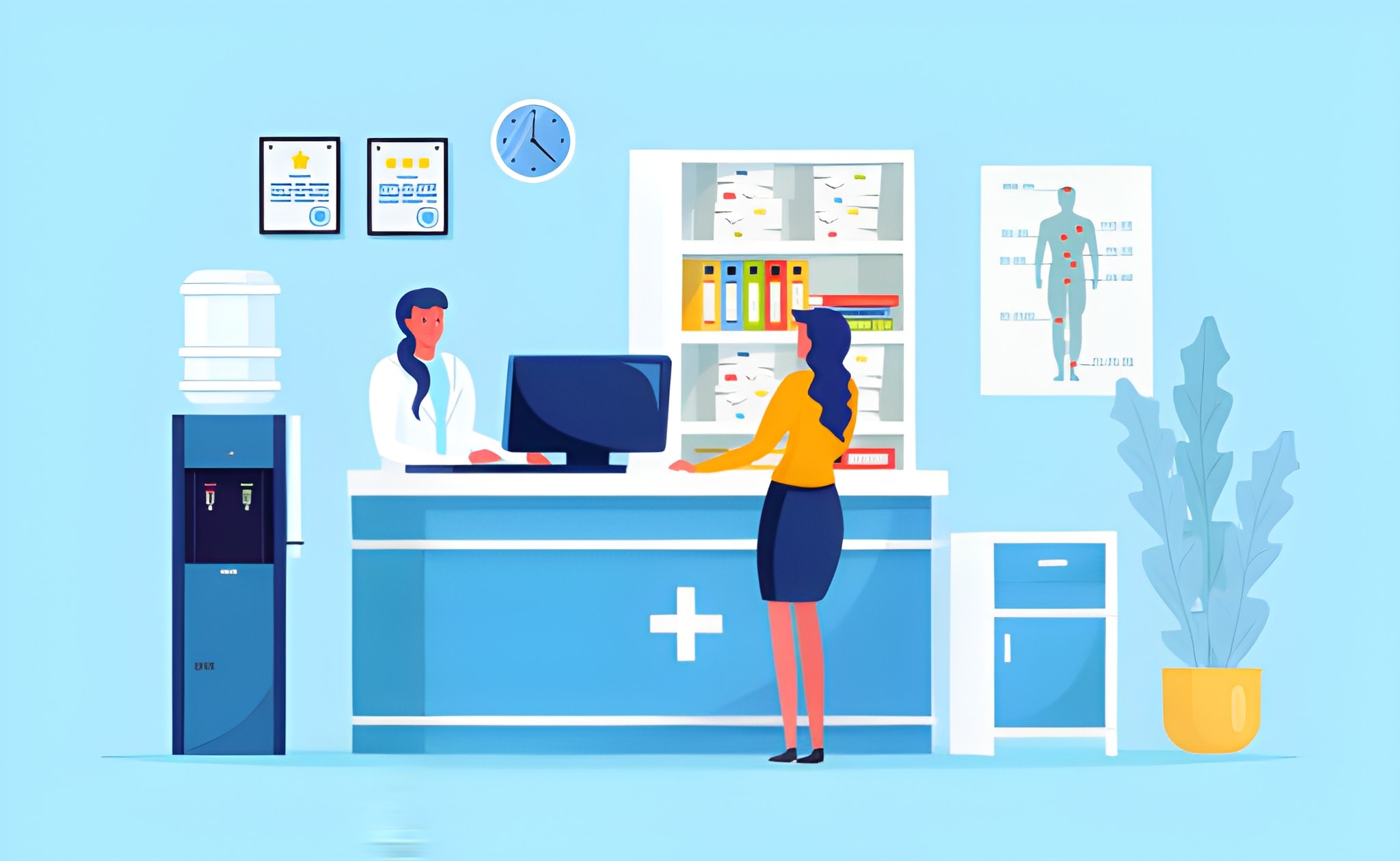In the rapidly evolving landscape of healthcare, digital transformation is no longer a choice—it’s a necessity. The fusion of artificial intelligence (AI) with healthcare operations has brought forth a new era of efficiency, particularly in patient communication and administrative management. One of the most transformative innovations is AI, a technology-driven solution that is reshaping how clinics, hospitals, and private practices interact with patients. By automating front-desk duties such as appointment scheduling, follow-up reminders, and call management, AI medical receptionists are redefining the boundaries of patient engagement and administrative productivity.
The traditional role of a human medical receptionist has always been vital, serving as the first point of contact for patients. However, with the increasing demand for 24/7 service and the pressure on healthcare providers to reduce costs, maintaining a fully staffed reception team around the clock has become a challenge. This is where AI systems come into play. These virtual assistants, powered by natural language processing and machine learning, ensure continuous support even during off-hours. They can greet patients, answer questions, update records, and manage complex scheduling tasks—all without fatigue or error.
Shift from Human to Hybrid Interaction
Clinics worldwide are adopting AI-driven reception solutions to streamline communication. This doesn’t mean replacing human staff but rather augmenting them. By automating repetitive and time-consuming tasks, AI allows human receptionists to focus on empathetic and high-value interactions. In this hybrid model, AI acts as the backbone of efficiency, handling inquiries swiftly while the human element remains essential for emotional and sensitive communications.
Moreover, the rise of AI medical receptionist technology aligns perfectly with the growing trend of virtual healthcare. As telemedicine becomes mainstream, clinics need digital systems capable of managing patient flows, online bookings, and follow-ups without delays. The digital desk is becoming the new front desk, offering patients the same level of warmth and professionalism through intelligent conversational interfaces.
Enhancing Patient Experience Through Automation
Patient satisfaction is the cornerstone of any successful medical practice. In today’s competitive healthcare market, convenience and responsiveness matter more than ever. Patients expect instant communication, accurate scheduling, and timely follow-ups. AI-driven systems meet these expectations by offering instant appointment confirmations, automated reminders, and quick answers to frequently asked questions.
Here, after-hours answering services for medical offices have become indispensable. Traditionally, clinics relied on call centers or on-call staff to handle patient inquiries after business hours. However, these systems often faced limitations, such as delayed responses or human error. Integrating AI into after-hours answering services for medical offices revolutionizes the process. AI can instantly triage calls, provide essential medical information, and forward urgent cases to on-call doctors. It reduces waiting times and ensures that patients always have access to reliable communication—even in the middle of the night.
Furthermore, AI-powered after-hours services significantly reduce operational costs. Unlike human-operated systems, AI tools do not require breaks or overtime pay, making them cost-efficient for clinics of all sizes. Through advanced algorithms, these systems can also detect patterns, predict patient needs, and personalize responses, ensuring that communication remains relevant and empathetic. In many modern practices, after hours answering services for medical offices integrated with AI technology have improved patient retention rates by ensuring consistent and compassionate service around the clock.
How AI Receptionists Support 24/7 Healthcare
The healthcare industry operates on a 24-hour cycle. Emergencies, follow-up queries, and scheduling requests don’t pause when the clinic closes. An AI medical receptionist provides seamless continuity in such scenarios. With speech recognition and context-aware algorithms, AI receptionists can interpret patient intent accurately and respond appropriately. For example, if a patient calls to inquire about test results or to reschedule an appointment, the AI system can verify information, update records, and notify the patient immediately.
These digital assistants can also handle multiple communication channels simultaneously, including phone calls, emails, and chat messages. They maintain professionalism while ensuring that no patient is left waiting. This instant responsiveness builds trust and reliability, key factors that enhance a clinic’s reputation. AI receptionists also ensure compliance with healthcare regulations like HIPAA, protecting sensitive patient data through encryption and secure authentication processes.
When integrated with services for medical offices, AI receptionists extend a clinic’s accessibility beyond standard hours. They can answer calls, categorize them by urgency, and notify medical staff if immediate attention is needed. This level of responsiveness ensures that critical cases receive timely intervention while routine queries are efficiently managed. The synergy between AI receptionists and after-hours systems bridges the gap between traditional clinic hours and patients’ expectations for continuous care.
Advantages Beyond Convenience
The benefits of integrating AI into medical administration go far beyond convenience. Clinics that adopt AI medical receptionist systems experience measurable improvements in efficiency, patient satisfaction, and financial performance. Routine administrative tasks—such as verifying insurance details, processing payments, or confirming appointments—are completed in seconds. The margin for error drops significantly, leading to fewer missed appointments and billing discrepancies.
For healthcare professionals, the reduction in administrative workload means more time can be dedicated to patient care. Studies show that AI reception systems can handle up to 70% of front-desk communication tasks autonomously. This optimization translates into faster operations and improved morale among healthcare teams, who can now focus on core medical functions.
Moreover, the insights generated by AI analytics provide valuable data for improving service delivery. Patterns in patient communication—such as common questions or scheduling bottlenecks—can help clinics refine their workflows. In the long run, this leads to better decision-making and patient-centered strategies.
Role of AI in Shaping Future Healthcare Communication
As technology continues to advance, the AI medical receptionist will evolve into an even more capable virtual partner. Future systems are expected to understand patient emotions through sentiment analysis, enabling more compassionate and human-like interactions. AI can also predict patient needs based on historical data, offering proactive care reminders or health advice.
For instance, imagine a system that reminds patients about preventive screenings or medication refills without being prompted. Such intelligent outreach can prevent health issues before they escalate, showcasing the true potential of AI in patient care management. Furthermore, integration with wearable devices and electronic health records (EHR) will allow these systems to deliver personalized communication based on real-time health metrics.
The ongoing improvement in after-hours answering highlights a broader shift in healthcare philosophy—toward accessibility, responsiveness, and inclusivity. With AI managing communication beyond office hours, patients no longer feel disconnected once clinics close. Instead, they receive consistent support through intuitive, round-the-clock digital engagement.
Ethical and Practical Considerations
Despite its many benefits, implementing AI in medical communication requires careful ethical and practical consideration. Patients must be informed when interacting with AI systems, ensuring transparency. Data privacy remains a top priority, as these systems handle sensitive health information. Additionally, while AI can replicate many administrative tasks, it cannot replace human empathy entirely.
Hence, the most successful healthcare models will blend human oversight with AI efficiency. Clinics should view these technologies as tools for empowerment rather than replacement. Training staff to collaborate with AI systems will be essential to maintaining trust and ensuring seamless operations.
Conclusion
The transition from traditional front desks to intelligent digital desks marks a pivotal moment in healthcare innovation. With the rise of AI, clinics are witnessing improved communication, efficiency, and patient satisfaction. These virtual assistants not only streamline administrative workflows but also ensure continuous, personalized support.




